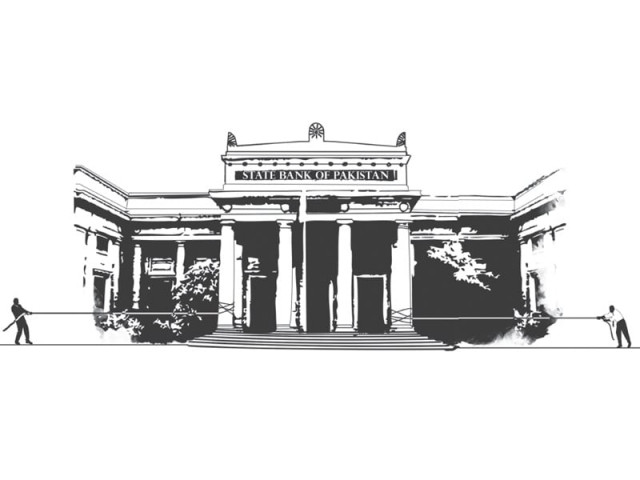View from McLeod Road: Why the banks probably hate the SBP right now
Bet on short-term treasury bonds is about to backfire on the country’s bankers.

It all boils down to this: there is very little difference between the interest rates the government pays out on its three-month bonds versus those that it pays out on its one-year bonds (about 0.03%, as of last month, the latest for which figures are available). Bankers felt that this difference was too little and essentially forced the government into selling them mostly three-month treasury bills by entering only absurdly high interest rate bids in the government’s treasury bond auctions.
This strategy seemed smart, at least when it was first conceived, which was when interest rates were high and many thought that they would go even higher. After all, if interest rates went higher, the banks would be able to reap the benefits from those in less than three months, when the bonds they held expired and the government refinanced them at the new, higher rate.
Banks would also be protected from the downside of a revaluation in their government bond portfolio (when interest rates go up, the prices of older bonds go down, which would have resulted in a hit on the banks’ financial statements.)
Yet, for some odd reason, the banks continued with this strategy, even when they knew that interest rates were likely going to keep on going down. They thought they could continue to hold the government hostage by demanding higher interest rates, or else forcing them to finance the fiscal deficit at very short-term durations.
The strategy has now backfired on the banks, and badly so. After the cut in the benchmark discount rate to 10.5%, the SBP has effectively reduced the interest rate on government borrowing. And since the banks have essentially stopped lending to the private sector, this leaves them badly exposed. Yes, they get the temporary benefit of their older bonds being re-priced higher, but that benefit lasts for less than three months: after that they must bear with the lower interest payments on a vast amount of their portfolio.
Government bonds constitute about 39.6% of total lending at the banks. About 70% of that is treasury bills, nearly all of which is the three-month treasury bills. Interest income at most banks in the country will be hit significantly in the third and fourth quarters of the current year.
It is not exactly clear why the central bank has done this. By their own admission, the last 200 basis point decrease in the discount rate has done nothing to encourage the banks to lend to the private sector. Indeed, net lending to the private sector was only Rs18 billion in the fiscal year ending June 30, 2012, according to the SBP’s own data.
And what of the impact on inflation? On this matter, at least, the central bank has effectively announced that it has given up: in the second paragraph of the monetary policy statement on Friday, the SBP admitted that the impact of monetary policy inflation is limited.
Indeed, the SBP seems to be going further than that. In a little-noticed working paper written by four SBP economists, the central bank essentially argues that prices in Pakistan change far too rapidly for monetary policy to have any meaningful impact. Price “stickiness” is a key assumption in macroeconomic models that call for inflation to be curbed through interest rates. If that assumption does not hold – and the data from the SBP study suggests it certainly does not hold in Pakistan – then the State Bank might as well cut interest rates to try to stimulate growth.
Published in The Express Tribune, August 11th, 2012.


















COMMENTS
Comments are moderated and generally will be posted if they are on-topic and not abusive.
For more information, please see our Comments FAQ